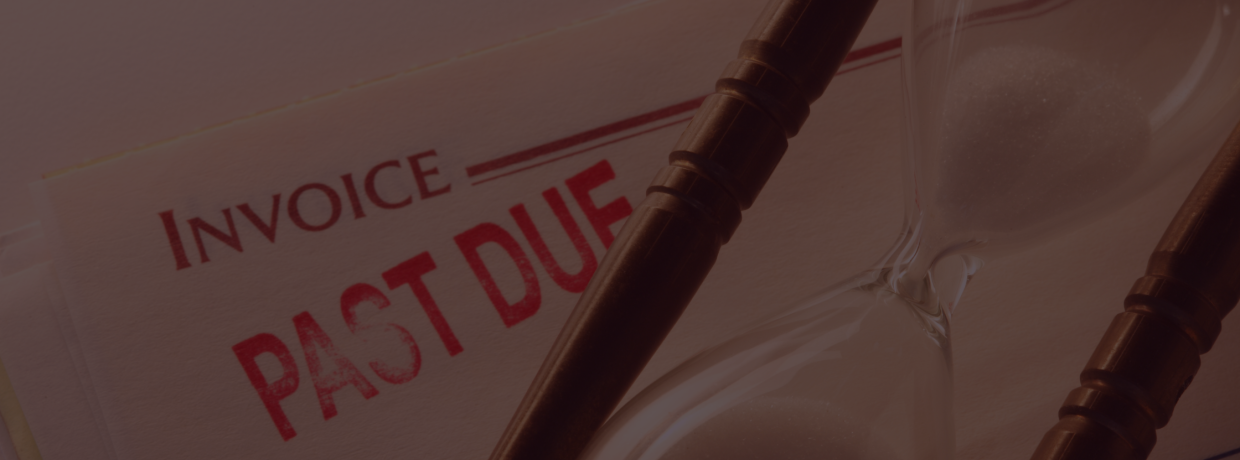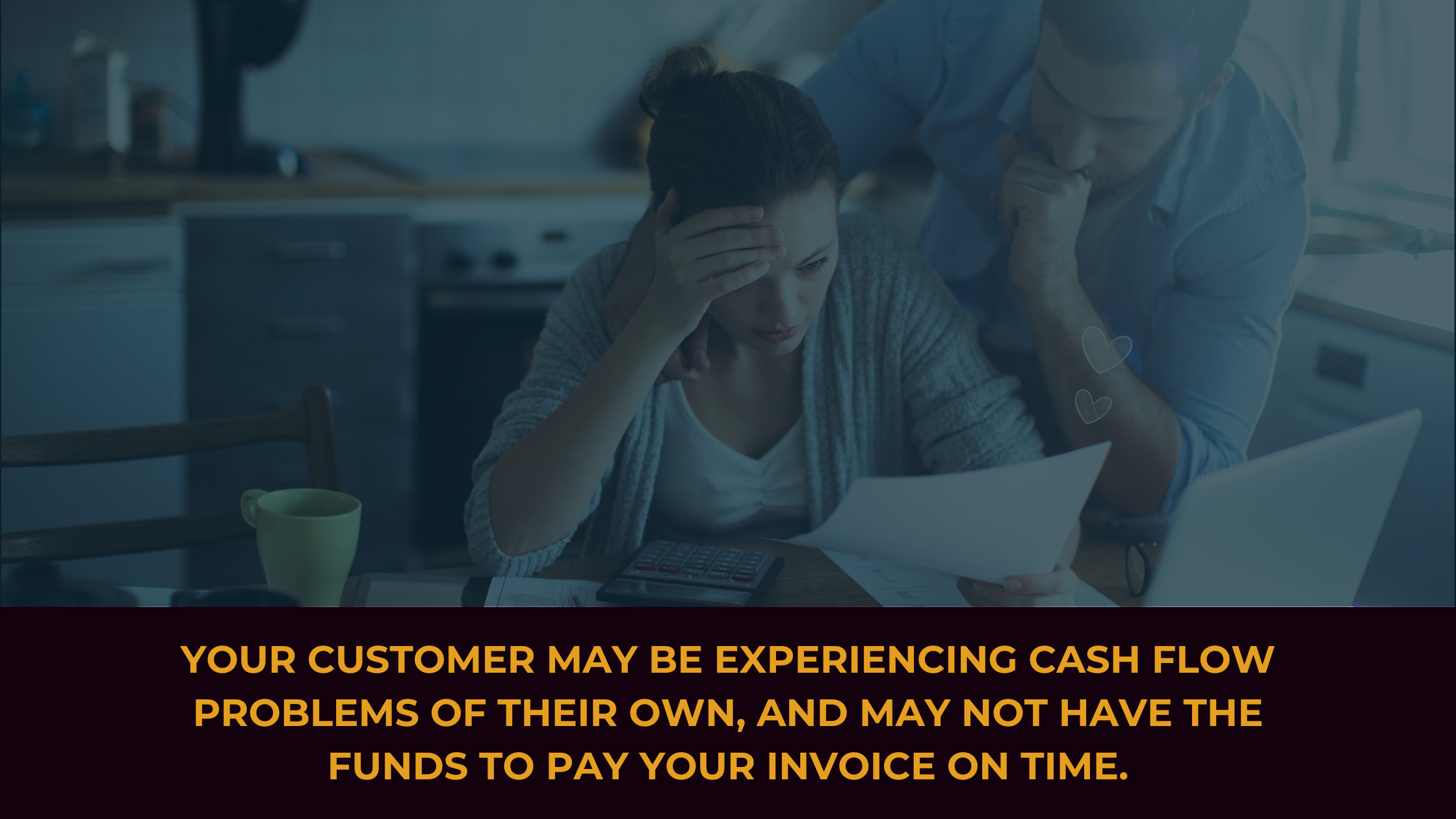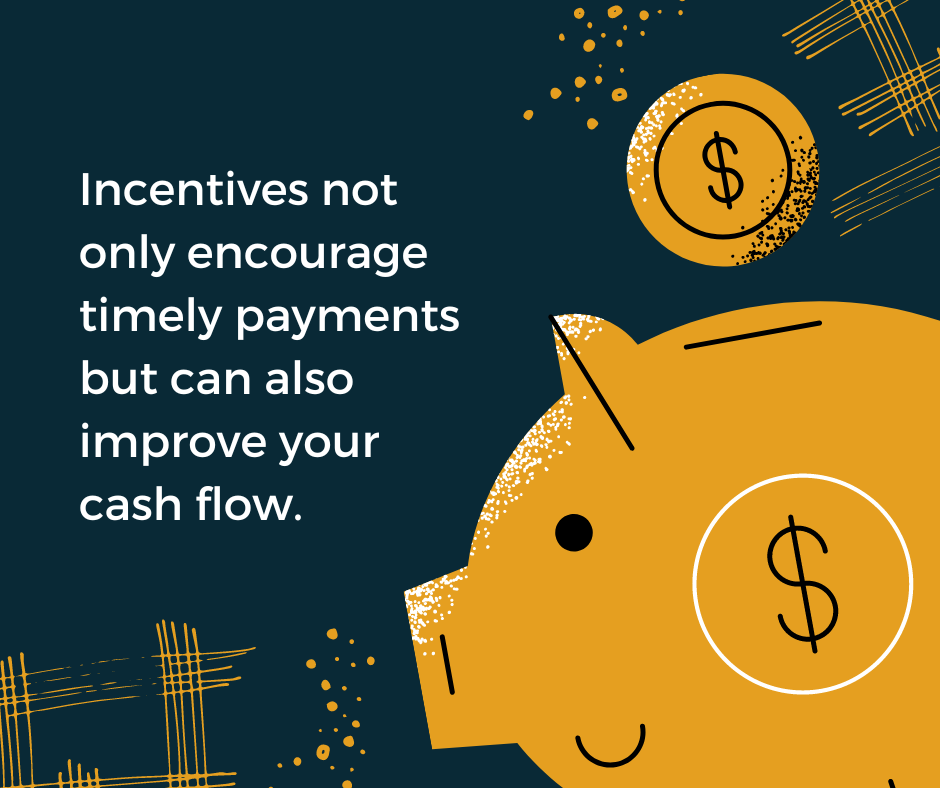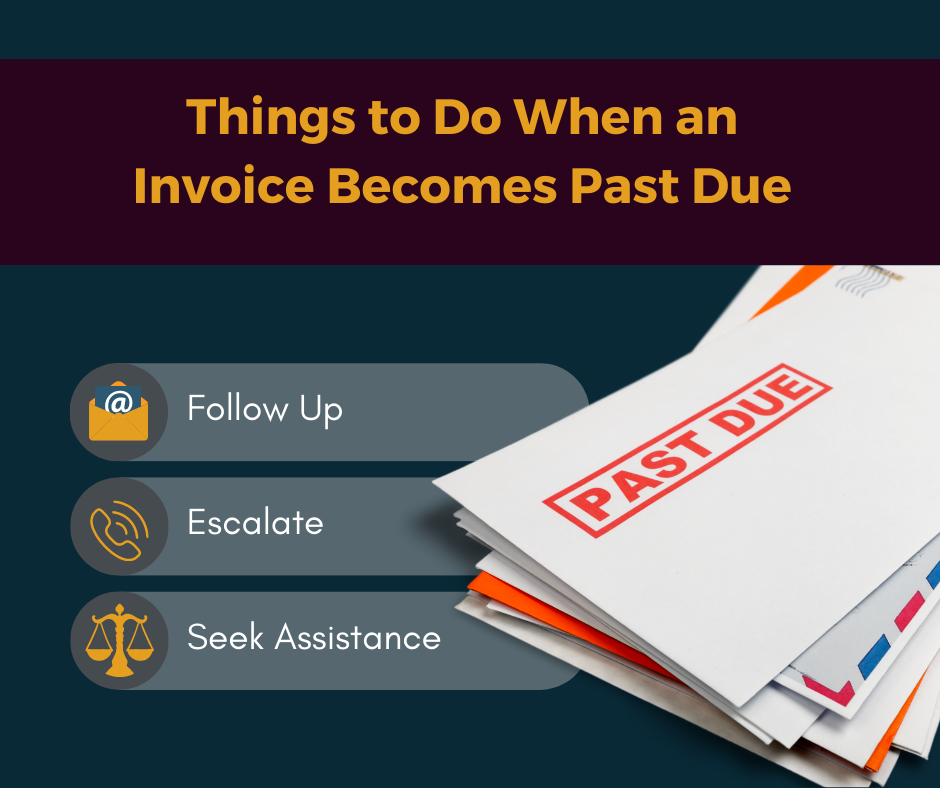
Subscribe to our newsletter!
We don't spam. You will only receive relevant and important tips for you and your business.
Unsubscribe anytime.
By Jaquie
Nearly 60% of small businesses face late or unpaid invoices at some point. Beyond the stress, missed payments disrupt cash flow and make it harder to grow. If you’ve ever dealt with a customer who won’t pay, you know the toll it takes on your time, energy, and bottom line.
The good news? With the right approach, you can reduce the risk of late payments and handle overdue accounts more confidently. Here’s how.

The first thing to note is that even if you follow all the best practices for invoicing and payment collection, there will inevitably be customers who are consistently late with payments or fail to pay at all. It's important to understand the reasons behind these payment issues so you can take steps to prevent them. By identifying the root causes of late or missed payments, you can tailor your approach to each customer and reduce the likelihood of future payment problems.
Cash flow issues are one of the most common reasons why customers fail to pay their invoices on time. Despite your best efforts, some customers may be experiencing financial difficulties that prevent them from paying on time or at all. It's important to remember that this is not a personal attack on your business or your work, but rather a reflection of the customer's financial situation.

Your customer may be facing a range of cash flow problems, such as delayed payments from their own customers, unexpected expenses, or a decrease in sales. As a result, they may prioritize paying bills that are more urgent or essential for their business, leaving your invoice unpaid.
While you can't control your customer's financial situation, you can take steps to mitigate the impact on your own business. For example, you can consider offering payment plans or alternative payment methods that are more flexible for customers experiencing cash flow issues.
Disputes arise when your customer raises concerns about the quality of your work or the accuracy of the billing. In some cases, they may feel that the work was not done to their satisfaction or that there were errors in the invoice.
This can lead to delays in payment as the customer may withhold payment until the issue is resolved.
To avoid disputes, it is important to maintain clear communication with your customers throughout the project or sales process. Make sure that both parties have a clear understanding of the scope of the work, the deliverables, and the pricing. Provide regular updates to your customer on the progress of the project or delivery of the product to ensure that they are satisfied with the work being done.
Additionally, consider implementing a dispute resolution process that outlines how you will handle disputes with your customers. This can include a clear and transparent process for raising concerns, addressing issues, and finding a mutually acceptable solution. Having a process in place can help you resolve disputes quickly and maintain a positive relationship with your customers.
Forgetfulness is a common reason why customers may fail to pay their invoices on time. With so many different demands on their attention, it can be easy for your invoice to slip through the cracks.
This can be especially true for larger companies, where multiple people may be responsible for managing invoices and payments. In some cases, your invoice may have been lost or misplaced, further adding to the issue.
To prevent forgetfulness from becoming a problem, it's important to ensure that your invoices are as clear and easy to understand as possible.
This includes providing a detailed breakdown of the services or products you provided, along with a clear due date and any late payment fees. You can also consider following up with your customers a few days before the payment is due, as well as on the day it is due, to remind them of the outstanding balance.
Additionally, you can help your customers stay on top of their payments by providing them with multiple payment options. This might include online payment methods or the ability to set up automatic payments. By making the payment process as easy and convenient as possible, you can reduce the chances of forgetfulness becoming an issue.
Deliberate non-payment is a frustrating and sometimes costly issue that can occur in any business. When customers deliberately refuse to pay, it can be a frustrating and challenging experience, particularly if you have provided a product or service that meets or exceeds their expectations.
As a business owner, it's important to have a plan in place for dealing with non-paying customers and to take steps to prevent the problem from occurring in the first place.
Quick Tip: Track late payers. If a client repeatedly delays, adjust your terms or request deposits before continuing work.
Dealing with non-paying customers is not only time-consuming and frustrating, but it can also have a significant impact on the financial health of your small business. It can disrupt your cash flow, impact your ability to pay your bills and employees, and even lead to bankruptcy in extreme cases.
That's why the first step in dealing with non-paying customers is to prevent the problem before it occurs. Here are a few tips to help you encourage your customers to pay their invoices on time:
Building strong relationships with customers is an essential aspect of running a successful business. Providing excellent customer service and being transparent about your business practices can help build trust, which is key to encouraging timely payments and avoiding payment issues.
One way to build strong relationships with your customers is to ensure that their experience with your business is positive from start to finish.
This means being responsive to their inquiries, addressing any concerns they may have promptly, and following through on your commitments. Consider sending personalized messages or thank-you notes to show your appreciation for their business and maintain a positive relationship.
Transparency is also important in building trust with your customers.
Make sure your payment terms and policies are clearly communicated to your customers, so they know what to expect. Consider providing them with regular updates on the status of their invoices, so they are aware of any issues that may arise.
Related: How Multigenerational Customer Service Can Win Over Every Age Group
Setting clear payment terms is a critical step in preventing non-paying customers. Your payment terms should be communicated clearly and upfront to your customers so that they know what is expected of them. Make sure that your payment terms are clearly stated on all relevant documents, including invoices, contracts, and your website.
In particular, it is important to clearly communicate the due date for payment, so that customers know exactly when their payment is due. This can help avoid any confusion or misunderstandings about when payment is expected.
Additionally, make sure to specify the payment methods that you accept, whether it be cash, credit card, check, or other forms of payment. This will help your customers understand how they can make payments and avoid any delays or complications.

Finally, consider including any late payment fees or interest charges in your payment terms. This can help incentivize customers to pay on time, and also compensate you for any additional work or costs that may be incurred as a result of delayed payments.
Make sure to communicate these fees and charges clearly to your customers, so that they understand the consequences of not paying on time. By setting clear payment terms, you can help prevent non-paying customers and ensure that your business runs smoothly.
Promptly sending invoices is critical in ensuring timely payment from your customers. After completing the work or delivering the product, it is important to send the invoice as soon as possible to avoid any payment delays.
The longer you wait to send the invoice, the longer it will take for the payment to be made.
Sending invoices promptly not only ensures that you receive payment promptly but also shows your customers that you are organized and professional. It sets a positive tone for your business relationship and fosters trust between you and your customers.
In addition, sending invoices promptly can also help you avoid any potential disputes or misunderstandings regarding payment terms. By sending the invoice promptly, your customers can review and confirm the payment amount and due date, avoiding any confusion or disagreement later on.
To streamline the invoicing process, consider using invoicing software that can help you automate the creation and sending of invoices. This can save you time and ensure that invoices are sent promptly without any errors or delays.
The key is to make the reminder friendly and professional in tone, rather than confrontational or aggressive. You can use automated reminder emails or software that allows you to customize the tone and message of your reminders.
When sending reminders, it is also important to keep track of the number of reminders you have sent and the method of communication. If a customer has not responded to several reminders, it may be necessary to escalate the situation and consider sending a formal notice of overdue payment.
By following up on unpaid invoices in a friendly and professional manner, you can encourage customers to pay on time, maintain a positive relationship with your customers, and ensure that your business is paid for the work that you have completed.
Offering incentives is a great way to encourage your customers to pay their invoices on time. Incentives can motivate them to prioritize your invoice over others they may have received.
Offering discounts for early payments or prepayments is a common practice that can be effective. For example, you could offer a 2% discount for payments made within 10 days of the invoice date or a 5% discount for prepayments made before the work starts.

It's important to note that the incentives you offer should not be so large that they negatively impact your profit margin. You also need to make sure that the incentive is worth the effort and cost of offering it.
Consider your business's financial situation and decide what incentives work best for your situation. For example, if you are a small business with limited cash flow, offering a small discount for early payments may be more feasible than offering a larger discount.
Another option is to offer incentives for referrals. If a customer refers a new client who pays on time, you could offer a discount on their next invoice. This not only encourages timely payments from the referred client but also encourages your existing customers to promote your business.
Using technology is a crucial step to efficiently manage your invoicing process and keep track of payments. One of the best tools you can utilize is accounting software, which can streamline and automate many of the time-consuming tasks associated with invoicing.
With accounting software, you can easily create professional-looking invoices, set up automatic payment reminders, and track payments in real time. This can save you a lot of time and effort, allowing you to focus on other aspects of your business.
Automating your invoicing and payment tracking processes also ensures that you have accurate and up-to-date information about your finances at all times. This can be particularly helpful when dealing with past-due invoices, as you can quickly identify which customers are late with their payments and send reminders to follow up. Additionally, some accounting software also provides reporting features that can give you insights into your cash flow and help you make informed decisions about your business.
Having a plan in place for dealing with non-paying customers is not only crucial for ensuring the smooth running of your business, but it is also essential for protecting your financial stability and ensuring that you receive the payments owed to you.
Without a plan, you may find yourself struggling to keep track of overdue invoices and spending valuable time and resources chasing up payments. This can be frustrating, time-consuming, and can ultimately lead to cash flow problems for your business.
By having a clear and effective plan in place, you can take a proactive approach to managing unpaid invoices, ensuring that you have a step-by-step process to follow when payments become overdue.
Implementing these strategies can help prevent late payments, however, sometimes invoices can still go unpaid. In these situations, it's important to know what steps you can take to recover your money and avoid further payment issues.
Even with preventive measures, some invoices go unpaid.
Here are a few steps to take when an invoice becomes past due.
When an invoice becomes past due, it's important to follow up with your customer to remind them of the payment that is due. Communication is key in these situations, and a friendly reminder can often be enough to prompt payment.
There are several ways you can reach out to your customer, including email, phone call, or text message. Choose the method that you think is most appropriate for your customer, and be sure to maintain a professional and polite tone.
In your follow-up message, make sure to include the original invoice and payment terms. This serves as a clear reminder of what is owed and when payment is expected.
It's also a good idea to include any late payment fees or interest charges that may apply. Be firm in your message, but avoid using aggressive language or making threats. Remember that you want to maintain a positive relationship with your customer, even if they are late with their payment.
Another important factor to consider when following up on late invoices is timing. You don't want to wait too long before reaching out, as this can give the impression that you are not serious about collecting the payment. Finding the right balance is key, and you may need to experiment with different approaches to see what works best for your business.
Escalating the matter is an essential step when an invoice remains unpaid even after sending reminders. If your initial reminder does not yield any results, the next step is to send a more formal letter or make a phone call. This step will show your customer that you are serious about receiving payment and that you are willing to take further action to get it.
When escalating, be sure to mention that the payment is now overdue and include a clear deadline for payment. You may also want to include information on the consequences of not paying, such as late payment fees or interest charges.

Consider Mediation: Consider mediation as an alternative to litigation when dealing with a customer who has not paid their invoice. Mediation involves the use of a neutral third party who can help facilitate a resolution between you and the customer. A mediator can help both parties to come to a mutually acceptable agreement, potentially saving you both time, money, and preserving your business relationship.
The process of mediation is typically confidential, which allows for open and honest communication between the parties involved. Mediators are trained to facilitate constructive discussions and to help identify common ground and solutions to disputes.
Mediation can be particularly useful when there are underlying issues or disputes that need to be addressed in addition to the payment of the outstanding invoice.
Consider reaching out to a mediation service or seeking the advice of a lawyer who can help you identify suitable mediators for your situation.
While mediation is not a guarantee of a successful resolution, it is a useful tool that can help you avoid the time, expense, and uncertainty of litigation.
Hire a Lawyer: Hiring a lawyer can be an effective option to help you recover unpaid invoices. A lawyer can help you understand your legal rights and options and can provide valuable advice on the best course of action to take.
One option is to have your lawyer send a formal demand letter to the customer. This letter should clearly state the amount owed, the payment terms, and the consequences of not paying, such as legal action. A demand letter from a lawyer can add a sense of urgency and seriousness to the situation, which may prompt the customer to pay the invoice.
Additionally, having a lawyer involved can help protect your business's legal interests and can help you navigate any legal complexities that may arise during the collections process. However, it's important to consider the costs associated with hiring a lawyer, as this can vary depending on the complexity of the case and the amount of work involved.
File a Lawsuit: If the customer is still unresponsive, filing a lawsuit may be necessary to protect your business interests.
Before proceeding, it's important to carefully consider the costs involved, including legal fees, court fees, and the time and effort required to prepare and present your case. You should also consult with a lawyer to make sure you have a strong case and are following all necessary legal procedures.
Filing a lawsuit in small claims court is often a viable option for debts under a certain amount, depending on the laws of your state. This can be a relatively quick and inexpensive process compared to other types of legal action. However, it's important to be aware of the specific rules and procedures for small claims court, as they can vary by state and jurisdiction.
Hire a Debt Collection Agency: Hiring a debt collection agency can be a last resort for businesses that have exhausted all other options to collect on unpaid invoices.
Debt collection agencies are experts in the art of collecting debts, and they have the necessary resources and knowledge to pursue legal action, negotiate payment plans, and use other methods to recover the debt owed to you.
However, before hiring a debt collection agency, it's important to do your research and choose a reputable agency with a track record of success. Look for an agency that is licensed and bonded, and that has experience in your industry. You should also make sure to read and understand the agency's fee structure and terms of service before signing a contract.
Keep in mind that hiring a debt collection agency does come with a cost. Debt collection agencies typically charge a percentage of the amount recovered, which can range from 25% to 50% or more, depending on the age of the debt and other factors. Additionally, some agencies may charge upfront fees or require a minimum debt amount before taking on a case.
Overall, hiring a debt collection agency can be an effective way to recover unpaid debts, but it should be used as a last resort. It's always better to try to resolve the issue with the customer directly or through mediation before resorting to legal action or hiring a third-party agency.
Dealing with non-paying customers can be a real headache, especially for small business owners who rely on steady cash flow to keep their operations going.
When you put in the time and effort to provide a product or service, you expect to be paid for it. It can be frustrating and disheartening when payments are not made on time or at all.
However, it's important to remember that you're not alone. Many businesses face similar challenges, and there are strategies and tips that can help you manage non-paying customers more effectively. By taking a proactive approach and implementing a plan for dealing with overdue invoices, you can minimize the impact on your business and reduce the stress and anxiety that comes with it.

When dealing with customers who are behind on payments, it's important to stay professional and courteous, but also firm in your communications.
It's also important to remember that there are resources available to help you navigate the process of dealing with non-paying customers. Don't be afraid to seek assistance if necessary, whether through legal action or involving a debt collection agency.
By taking a proactive approach and using these strategies, you can minimize the impact of non-paying customers on your business and focus on what really matters – delivering quality products or services to your customers and growing your business.
Want to Grow Your Business?